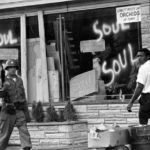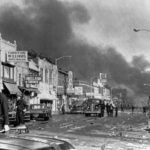ALBUQUERQUE, N.M. — Barriers to equality are posing threats to democracy in the U.S. as the country remains segregated along racial lines and child poverty worsens, says a study examining the nation 50 years after the release of the landmark 1968 Kerner Report.
The new report released Tuesday blames U.S. policymakers and elected officials, saying they’re not doing enough to heed the warning on deepening poverty and inequality as highlighted by the Kerner Commission a half-century ago, and it lists a number of areas where the country has seen “a lack of or reversal of progress.”
“Racial and ethnic inequality is growing worse. We’re resegregating our housing and schools again,” former U.S. Sen. Fred Harris of Oklahoma, a co-editor of the new report and last surviving member of the original Kerner Commission created by President Lyndon Johnson in 1967. “There are far more people who are poor now than was true 50 years ago. Inequality of income is worse.”
The new study titled “Healing Our Divided Society: Investing in America Fifty Years After the Kerner Report” says the percentage of people living in deep poverty — less than half of the federal poverty level — has increased since 1975. About 46 percent of people living in poverty in 2016 were classified as living in deep poverty — 16 percentage points higher than in 1975.
And although there has been progress for Hispanic homeownership since the Kerner Commission, the homeownership gap has widened for African-Americans, the report found. Three decades after the Fair Housing Act of 1968 passed, black homeownership rose by almost 6 percentage points. But those gains were wiped out from 2000 to 2015 when black homeownership fell 6 percentage points, the report says.
The report blames the black homeownership declines on the disproportionate effect the subprime crisis had on African-American families.
In addition, gains to end school segregation were reversed because of a lack of court oversight and housing discrimination. The court oversight allowed school districts to move away from desegregation plans and housing discrimination forced black and Latino families to move into largely minority neighborhoods.
In 1988, for example, about 44 percent of black students went to majority-white schools nationally. Only 20 percent of black students do so today, the report says.
The result of these gaps means that people of color and those struggling with poverty are confined to poor areas with inadequate housing, underfunded schools and law enforcement that views those residents with suspicion, the report said.
Those facts are bad for the whole country, and communities have a moral responsibility to address them now, said Harris, who now lives in Corrales, New Mexico.
The new report calls on the federal government and states to push for more spending on early childhood education and a $15 minimum wage by 2024. It also demands more regulatory oversight over mortgage leaders to prevent predatory lending, community policing that works with nonprofits in minority neighborhoods and more job training programs in an era of automation and emerging technologies.
“We have to have a massive outcry against the state of our public policies,” said the Rev. William J. Barber II, a Goldsboro, North Carolina pastor who is leading a multi-ethnic “Poor People’s Campaign: A National Call for Moral Revival” next month in multiple states. “Systemic racism is something we don’t talk about. We need to now.”
The late President Johnson formed the original 11-member Kerner Commission as Detroit was engulfed in a raging riot in 1967. Five days of violence over racial tensions and police violence would leave 33 blacks and 10 whites dead, and more than 1,400 buildings burned. More than 7,000 people were arrested.
That summer, more than 150 cases of civil unrest erupted across the United States. Harris and other commission members toured riot-torn cities and interviewed black and Latino residents and white police officers.
The commission recommended that the federal government spend billions to attack structural racism in housing, education and employment. But Johnson, angry that the commission members didn’t praise his anti-poverty programs, shelved the report and refused to meet with members.
Alan Curtis, president of the Milton S. Eisenhower Foundation and co-editor of the new report, said this study’s attention to systemic racism should be less startling to the nation given the extensive research that now calls the country’s discriminatory housing and criminal justice systems into question.
Unlike the 1968 findings, the new report includes input from African-Americans, Latinos, Native Americans and women who are scholars and offer their own recommendations.
“The average American thinks we progressed a lot,” said Kevin Washburn, a law professor at the University of New Mexico, a citizen of the Chickasaw Nation of Oklahoma and one of the people who shared his observations for the report. “But there are still some places where Native people live primitive lives. They don’t have access to things such as good water, electricity and plumbing.”
Like the 1968 report, the new study also calls out media organizations for their coverage of communities of color, saying they need to diversify and hire more black and Latino journalists.
News companies could become desensitized to inequality if they lack diverse newsrooms, and they might not view the issue as urgent or newsworthy, said journalist Gary Younge, who also gave input to the report.
“It turns out that sometimes ‘dog bites man’ really is the story,” Younge said. “And we keep missing it.”










